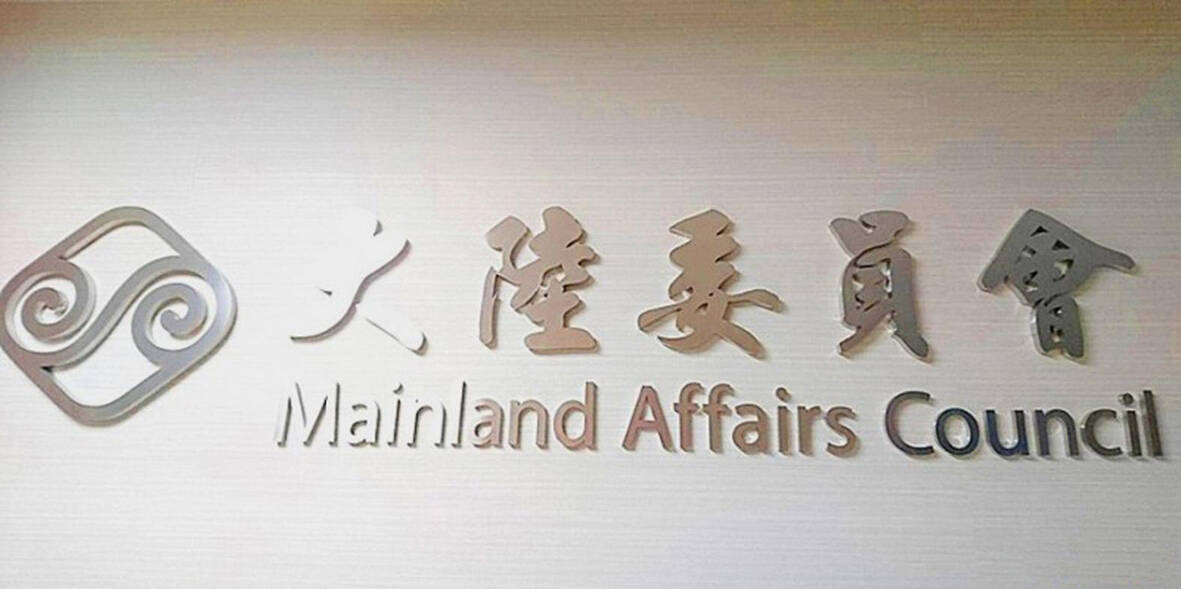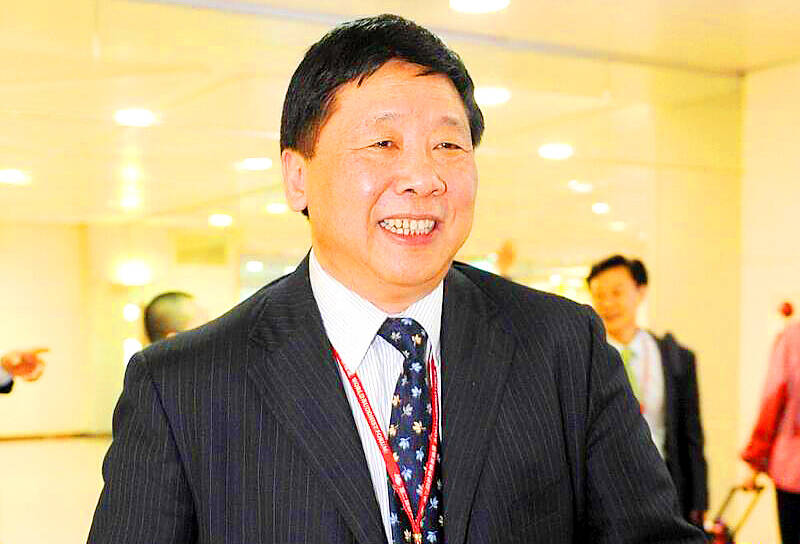China is exploiting the passing of Buddhist master Hsing Yun (星雲) for political purposes, the Mainland Affairs Council (MAC) said yesterday, rejecting accusations that the Democratic Progressive Party (DPP) government refused to allow a Chinese delegation entry to Taiwan for Hsing Yun’s funeral tomorrow.
China’s Taiwan Affairs Office (TAO) spokeswoman Zhu Fenglian (朱鳳蓮) earlier yesterday said that a 38-member Chinese delegation scheduled to attend the funeral was canceled at the last minute.
“The DPP disregarded basic humanitarian principles and rudely rejected the mainland’s delegation to Taiwan,” Zhu said.

Photo: Chung Li-hua, Taipei Times
The planned delegation would have been headed by former Chinese State Administration for Religious Affairs director Ye Xiaowen (葉小文) and TAO Deputy Director Long Mingbiao (龍明彪).
Five other TAO personnel, four officials from the Chinese Communist Party’s United Front Work Department and three officials from the TAO’s provincial-level agency would have also attended.
The MAC said that Beijing had not followed the mechanism to facilitate cross-strait visits and was wrongly blaming the DPP administration.

Photo: Chen Cheng-yu, Taipei Times
“When Chinese officials plan to visit Taiwan, they should follow protocol and provide their itinerary to the MAC, but we did not receive any messages from Beijing regarding attendance at the funeral,” a MAC official said, speaking on condition of anonymity.
The council on Friday denied Ye’s request to visit, saying that aside from evidence linking Ye to religious persecution and denial of religious freedoms, another factor was potential social disruption, as his visit for the 2009 World Buddhist Forum had sparked widespread protests.
Ye was denied entry to Taiwan mainly to ensure that Hsing Yun’s memorial service proceeds smoothly, the council said.
Long and other officials in the delegation did not utilize the appropriate MAC channels, and therefore were not granted permits to visit Taiwan, the MAC official said.
DPP Legislator Wang Ting-yu (王定宇) yesterday said that “China is using the death of Hsing Yun to conduct united front tactics and disseminate propaganda in Taiwan.”
“This is unethical and highly disrespectful by exploiting the passing of a major religious figure,” Wang said.
Taiwan People’s Party caucus whip Chiu Chen-yuan (邱臣遠) called on Chinese authorities to avoid sensitive political matters during the funeral period, and urged the Chinese delegation to follow the MAC’s protocols to enter Taiwan.
The MAC welcomes other Chinese groups traveling to Taiwan for Hsing Yun’s memorial service, it said in a statement.
Taiwan has expedited approval of entry permits for about 120 people from China to attend the funeral, including relatives and family friends of Hsing Yun, delegations from Chinese Buddhist organizations, and Buddhist temple managers and other religious figures based in China, it said, adding that many of them arrived yesterday.
Hsing Yun, founder of the Kaohsiung-based Buddhist organization Fo Guang Shan, died on Sunday last week at the age of 95.
A memorial service is to be held at the Hsing Yun Cloud Dwelling Building tomorrow morning.

CHAOS: Iranians took to the streets playing celebratory music after reports of Khamenei’s death on Saturday, while mourners also gathered in Tehran yesterday Iranian Supreme Leader Ayatollah Ali Khamenei was killed in a major attack on Iran launched by Israel and the US, throwing the future of the Islamic republic into doubt and raising the risk of regional instability. Iranian state television and the state-run IRNA news agency announced the 86-year-old’s death early yesterday. US President Donald Trump said it gave Iranians their “greatest chance” to “take back” their country. The announcements came after a joint US and Israeli aerial bombardment that targeted Iranian military and governmental sites. Trump said the “heavy and pinpoint bombing” would continue through the week or as long

TRUST: The KMT said it respected the US’ timing and considerations, and hoped it would continue to honor its commitments to helping Taiwan bolster its defenses and deterrence US President Donald Trump is delaying a multibillion-dollar arms sale to Taiwan to ensure his visit to Beijing is successful, a New York Times report said. The weapons sales package has stalled in the US Department of State, the report said, citing US officials it did not identify. The White House has told agencies not to push forward ahead of Trump’s meeting with Chinese President Xi Jinping (習近平), it said. The two last month held a phone call to discuss trade and geopolitical flashpoints ahead of the summit. Xi raised the Taiwan issue and urged the US to handle arms sales to

BIG SPENDERS: Foreign investors bought the most Taiwan equities since 2005, signaling confidence that an AI boom would continue to benefit chipmakers Taiwan Semiconductor Manufacturing Co’s (TSMC, 台積電) market capitalization swelled to US$2 trillion for the first time following a 4.25 percent rally in its American depositary receipts (ADR) overnight, putting the world’s biggest contract chipmaker sixth on the list of the world’s biggest companies by market capitalization, just behind Amazon.com Inc. The site CompaniesMarketcap.com ranked TSMC ahead of Saudi Aramco and Meta Platforms Inc. The Taiwanese company’s ADRs on Tuesday surged to US$385.75 on the New York Stock Exchange, as strong demand for artificial intelligence (AI) applications led to chip supply constraints and boost revenue growth to record-breaking levels. Each TSMC ADR represents

Pro-democracy media tycoon Jimmy Lai’s (黎智英) fraud conviction and prison sentence were yesterday overturned by a Hong Kong court, in a surprise legal decision that comes soon after Lai was jailed for 20 years on a separate national security charge. Judges Jeremy Poon (潘兆初), Anthea Pang (彭寶琴) and Derek Pang (彭偉昌) said in the judgement that they allowed the appeal from Lai, and another defendant in the case, to proceed, as a lower court judge had “erred.” “The Court of Appeal gave them leave to appeal against their conviction, allowed their appeals, quashed the convictions and set aside the sentences,” the judges